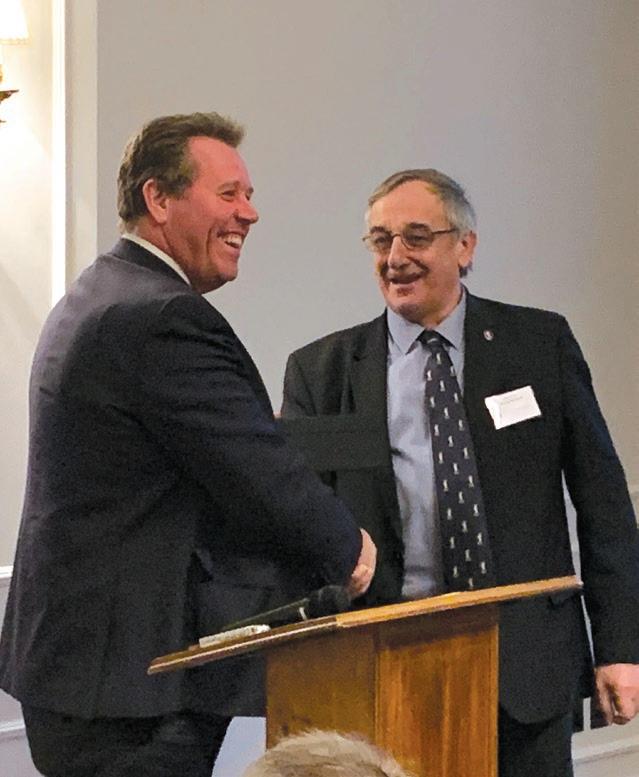
3 minute read
Monday Evening Lecture
WELCOMING the Rt Hon Mark Spencer MP to the latest Monday Evening Lecture, Club Chairman Meurig Raymond led a vibrant evening’s discussion as the Minister of State demonstrated his strong grasp of the DEFRA brief and a steely determination to represent farming in Westminster.

Advertisement
Throughout the debate the need for Government and the public to see food security as a public good was an underlying theme. But challenge, change and collaboration were key topics too.
Mr Spencer admitted his April evening at The Club was somewhat of a ‘home tie’. “Normally I’d give a bit of a resume of my farming credentials, but too many here know the truth, it’s my son who does the farming these days, with my wife and daughter looking after the farm shop.”
Nonetheless he keeps his hand in at home with practical farming when he can. A few weeks earlier, whilst on tractor duty, he had considered who had the greatest impact on agriculture in recent generations. Maybe Norman Borlaug with his modern wheat varieties, Harry Ferguson developing the threepoint linkage and draft hydraulics, or Fritz Haber with the industrial process for creating artificial nitrogen fertiliser.
Britain’s farming industry had played its part too. The Norfolk four-course rotation, Jethro Tull’s seed drill and Michael Sterling’s threshing machines were prime examples. “Britain has always been at the development edge of farming and a driving force of innovation.”
Challenges force change
Farming innovations met the challenges of the time, feeding millions, proving pessimists wrong and creating the world we live in today, he said. “Maybe you could argue we are in one of those key challenging moments now.” The global pandemic, Putin’s war in Ukraine and climate change were combining to pose enormous challenges today.

He acknowledged that farming needed to be profitable, productive enough for farmers to survive and attract the best and brightest people, able to innovate and seize the moment. But to do that farming needed to change.
“In my opinion there is a cliff edge coming. We will need to make difficult decisions about how we produce our food and how we support our farmers. We might be able to delay that point arriving, but we certainly won’t be able to stop it.”
British food has a global reputation for quality, but needs to be low carbon too, and have its own brand identity and premium at the tills. Government would not provide all the required answers, he stressed, it needed to be a collaborative approach.
In England Government would work to create an environment for farmerled innovation, he argued. “We’re not hemming farmers in.” The flexible Sustainable Farming Incentive and Countryside Stewardship Plus, were cases in point.
Investing in productivity
Hundreds of millions of pounds of grants and R&D funding, backed by business advice already delivered to 10,000 farmers, was targeted at helping farmers do more with less water, energy, equipment, labour and land, solving the major challenges, whilst increasing productivity, he stressed.
Living in a moment of change meant it was time for farmers to make change happen and for Government to support farmers in doing the right thing, he maintained.
Food security had never been so high on the political agenda, so farming needed to take advantage of that. £2.4bn invested by the Treasury was a lot. It needed to understand it was getting value for money.
On market failure he insisted Government would intervene if needed. “From day one we have recognised the problems in eggs, horticulture and pigs. Supermarkets need to be fair and we’re pushing behind the scenes. It feels like producers are taking all the risk and retailers taking all the benefits. We will intervene if we have to, including in the dairy sector.”
He saw the retail sector’s drive for open book pricing as a barrier to innovation.
Farming needed to retake the initiative on animal welfare and the environment, he urged. “I wonder if farming has been so brilliant at keeping people well fed that it abdicated responsibility for the environment and animal welfare to NGOs, who are now holding us to account. We need to retake that initiative.”
Collaboration needed
Across the board greater collaboration would be key. “We’re pretty rubbish as farmers at collaborating,” he noted. Government support for producer groups could help, but people with leadership skills would make the greatest difference.
Collaboration between the UK’s nations was also needed. Electronic livestock ID tags set at different frequencies were a case in point, risking the destruction of cross-border trade.
Collaborating with trade partners had merit too. “There are huge opportunities in Asia, especially for lamb, given the UK’s reputation for welfare and quality. So working on seasonality with Australia and New Zealand is a real opportunity, and the trade deals with them have allowed discussions to start.”
Tackling crime in food production was a further key issue. “It’s been prevalent for a long time, so we do need to look at how we address it, because we’re dealing with proper criminals.”
Drawing the wide-ranging debate to a close Mr Raymond thanked the Minister for his very candid, very honest responses. “We are very fortunate to have you as a minister in DEFRA, making the case on our behalf. You understand farming and always have, and am very confident you can drive that message of food security being a public good to Government.”
Glorious sunshine enhanced the beauty of Pembrokeshire as Club Members toured the Chairman’s home county.

